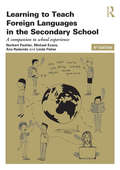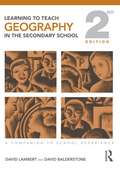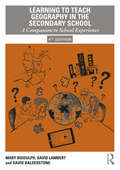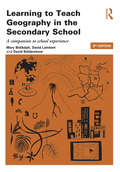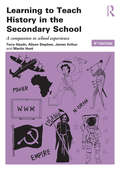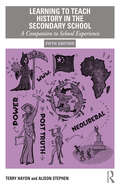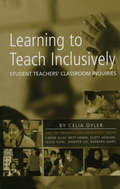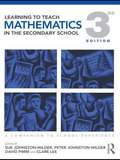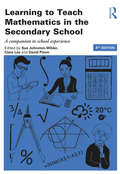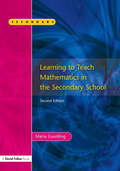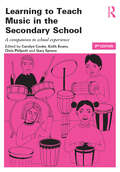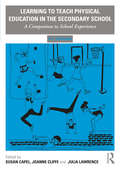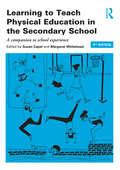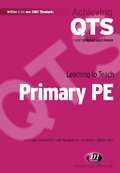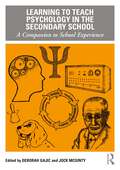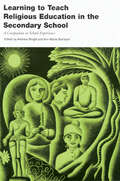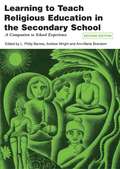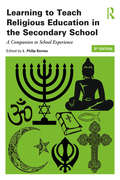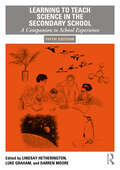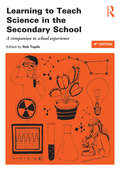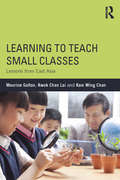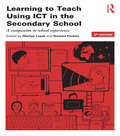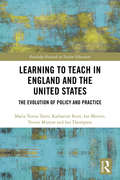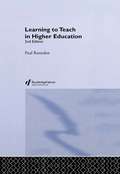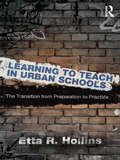- Table View
- List View
Learning to Teach Foreign Languages in the Secondary School: A companion to school experience (Learning to Teach Subjects in the Secondary School Series)
by Norbert Pachler Michael Evans Linda Fisher Ana RedondoLearning to Teach Foreign Languages in the Secondary School has established itself as the leading textbook for student teachers of foreign languages in the UK and internationally. The practical focus is underpinned by a theoretical perspective and backed up by the latest research, encouraging you to develop a personal approach to foreign language teaching. This new, fourth edition, has been comprehensively updated to take account of recent policy and curriculum changes, and now covers a range of relevant statutory frameworks. Fully revised chapters cover the key knowledge and skills essential for becoming a foreign language teacher: What can we learn from research into language teaching and learning? Teaching methods and learning strategies. Creating a meaningful learning environment. Transition from Primary to Secondary. The role of digital technologies. Teaching in the target language. Receptive skills and productive skills. Teaching and learning grammar. Planning and reflecting on classroom practice. Pupil differences and differentiation. Assessment for and of learning. It includes many examples of how to analyse practice to ensure pupil learning is maximised, together with activities and tasks to support you as you analyse your own learning and performance. Learning to Teach Foreign Languages in the Secondary School provides practical help and support for many of the situations and potential challenges you are faced with in school. It is an essential purchase for every aspiring secondary foreign languages school teacher.
Learning to Teach Geography in the Secondary School: A Companion to School Experience
by David Lambert David BalderstoneLearning to Teach Geography in the Secondary School has become the widely recommended textbook for student and new teachers of geography. It helps them acquire a deeper understanding of the role, purpose and potential of geography within the secondary curriculum, and provides the practical skills needed to design, teach and evaluate stimulating and creative lessons. This fully revised and updated second edition takes account of new legislation and important developments in geography education, including literacy, numeracy, citizenship, and GIS. Brand new chapters in this edition provide essential guidance on fieldwork, and using ICT in the context of geography teaching and learning. Chapters on teaching strategies, learning styles and assessment place the learner at the centre stage, and direct advice and activities encourage successful practice. Designed for use as a core textbook Learning to Teach Geography in the Secondary School is essential reading for all student teachers of geography who aspire to become effective, reflective teachers.
Learning to Teach Geography in the Secondary School: A Companion to School Experience (Learning to Teach Subjects in the Secondary School Series)
by David Lambert David Balderstone Mary BiddulphLearning to Teach Geography in the Secondary School has become the widely recommended textbook for student and new teachers of geography. It helps you acquire a deeper understanding of the role, purpose and potential of geography within the secondary curriculum, and provides the practical skills needed to design, teach and evaluate stimulating and challenging lessons. It is grounded in the notion of social justice and the idea that all students are entitled to a high-quality geography education. The very practical dimension provides you with support structures through which you can begin to develop your own philosophy of teaching and debate key questions about the nature and purpose of the subject in school. Thoroughly updated to take account of the latest research, evidence and policy, this new edition reflects new developments in technology as well as current thinking on curriculum, pedagogy and assessment. Exploring the fundamentals of teaching and learning geography in school, chapters cover: Why we teach geography – its purposes and intent Understanding and planning the curriculum – what to teach Effective pedagogy – how to teach Inclusion Assessment Developing and using resources Fieldwork and outdoor learning Values and school geography’s contribution to ‘citizenship’ Professional development Intended as a core textbook and written with both university and school-based initial teacher education in mind, Learning to Teach Geography is essential reading for all those who aspire to become able, effective and above all, thoughtful and reflective teachers.
Learning to Teach Geography in the Secondary School: A companion to school experience (Learning to Teach Subjects in the Secondary School Series)
by David Lambert David Balderstone Mary BiddulphLearning to Teach Geography in the Secondary School has become the widely recommended textbook for student and new teachers of geography. It helps you acquire a deeper understanding of the role, purpose and potential of geography within the secondary curriculum, and provides the practical skills needed to design, teach and evaluate stimulating and challenging lessons. It is grounded in the notion of social justice and the idea that all students are entitled to a high quality geography education. The very practical dimension provides you with support structures through which you can begin to develop your own philosophy of teaching, and debate key questions about the nature and purpose of the subject in school. Fully revised and updated in light of extensive changes to the curriculum, as well as to initial teacher education, the new edition considers the current debates around what we mean by geographical knowledge, and what’s involved in studying at Masters level. Key chapters explore the fundamentals of teaching and learning geography: Why we teach and what to teach Understanding and planning the curriculum Effective pedagogy Assessment Developing and using resources Fieldwork and outdoor learning Values in school geography Professional development Intended as a core textbook and written with university and school-based initial teacher education in mind, Learning to Teach Geography in the Secondary school is essential reading for all those who aspire to become effective, reflective teachers. Praise for previous editions of Learning to Teach Geography in the Secondary School... 'This is a practical and visionary book, as well as being superbly optimistic. It has as much to offer the experienced teacher as the novice and could be used to reinvigorate geography departments everywhere. Practical activities and ideas are set within a carefully worked out, authoritative, conceptual framework.' - The Times Educational Supplement 'This is a modern, powerful, relevant and comprehensive work...a standard reference for many beginning teachers on geography initial teacher training courses.' - Educational Review
Learning to Teach History in the Secondary School: A Companion to School Experience (Learning to Teach Subjects in the Secondary School Series)
by James Arthur Martin Hunt Terry Haydn Alison Stephen'An excellent companion to Learning to Teach in Secondary School ... full of good ideas and better advice ... Mentors will certainly want to use it, and so, I'm sure, will the rest of the history department ... Make sure they buy one, and keep your copy under lock and key.' – Michael Duffy, Times Educational Supplement 'A very well written and readable book. Overall, this is an excellent book and one which students and teachers outwith England would find a valuable addition to their library.' – Scottish Association of Teachers of History, Resources Review ‘This book is without question the standard text for the history PGCE market.’ – Dr Ian Davies, University of York, on the first edition. ? Learning to Teach History in the Secondary School provides an accessible introduction to teaching and learning history at secondary level. Underpinned by a theoretical perspective and backed up by the latest research, it encourages student teachers to develop a personal approach to teaching history. This fourth edition has been thoroughly updated for the new curriculum, with a brand new chapter on subject knowledge and a new section on action research to better support those reflecting on and developing their own practice. It provides an array of references and materials that give a sound theoretical foundation for the teaching of history, including weblinks to further resources, while a range of tasks will enable students to put their learning into practice in the classroom. Practical advice is combined with reference and access to a wide range of recent and relevant research in the field of history education, to support Masters Level research and aid reflective practice. Key issues covered include: The benefits of learning history Planning The use of language and strategies for teaching Inclusion Technology in history teaching Assessment Continuing professional development Offering comprehensive and accessible support to becoming a history teacher, this book remains an invaluable resource for all training and newly qualified history teachers.
Learning to Teach History in the Secondary School: A Companion to School Experience (Learning to Teach Subjects in the Secondary School Series)
by Terry Haydn Alison StephenIn some hands, history can be an inspirational and rewarding subject, yet in others it can seem dry and of little relevance. Learning to Teach History in the Secondary School, now in its fifth edition and established as one of the leading texts for all history student teachers, enables you to learn to teach history in a way that pupils will find interesting, enjoyable and purposeful. It incorporates a wide range of ideas about the teaching of history with practical suggestions for classroom practice. The fifth edition has been thoroughly updated in the light of recent developments in the field of history education. The book contains chapters on: • Purposes and benefits of school history • Planning strategies • Teaching approaches and methods • Developing pupils’ historical understanding • Ensuring inclusion • New technologies in the history classroom • Assessment and examinations • Your own continuing professional development Each chapter includes suggestions for further reading, weblinks to useful resources and a range of tasks enabling you to put learning into practice in the classroom. Written by experts in the field, Learning to Teach History in the Secondary School offers all training and newly qualified teachers comprehensive and accessible guidance to support the journey towards becoming an inspirational and engaging history teacher.
Learning to Teach Inclusively: Student Teachers' Classroom Inquiries
by Celia OylerThis book—co-authored by a teacher educator, a diverse group of five pre-service student teachers, and their student teaching supervisor—takes a unique, illuminating look at the experience of student teaching from the perspective of student teachers. It is premised on learning to teach as an inquiry process enriched by collaborative conversations. Readers are invited into student teachers’ dilemmas and decisions as they negotiate between their public school placements and their university-based coursework. Throughout the year of student teaching, the authors document their discussions and reflections about teaching in inclusive classrooms that shed light on the complex process of learning to teach and also offer insights into issues of teaching for equity. Each of the central chapters is written by an individual student teacher and tracks a specific question over the course of two semesters. Topics include: *contrasting models of inclusion and teachers’ differing orientations toward issues of community, difference, and normalcy;*how teachers foster peer relationships;*classroom management and discipline; *heterogeneous instruction; and*school-wide culture and systems that promote or mitigate against inclusion. A new perspective on what can be learned from student teaching is provided by the student teachers’ supervisor. In the concluding chapter, the teacher educators address the connections among the student teachers’ inquiries and offer an analysis from a disability studies/disability rights perspective on how inclusion fits into a social (rather than a medical) model of disability. All of the authors of this book seek to contribute to conversations that place advocacy, inquiry, contestation, and challenge at the center of the teacher’s role. This volume is their invitation to readers to join in a larger conversation about the challenges of, and necessity for, becoming inclusive teachers. Learning to Teach Inclusively is intended for inservice and preservice courses in elementary education, inclusion, and teacher research, and for field experience seminars. It is also suitable for graduate courses in teacher research, supervision, and research in teacher education.
Learning to Teach Mathematics in the Secondary School: A Companion to School Experience
by David Pimm Sue Johnston-Wilder Clare LeeWhat is the role of mathematics in the secondary classroom? What is expected of a would-be maths teacher? How is mathematics best taught and learnt? Learning to Teach Mathematics in the Secondary School combines theory and practice to present a broad introduction to the opportunities and challenges of teaching mathematics in the modern secondary school classroom. Written specifically with the new and student teacher in mind, the book covers a wide range of issues related to the teaching of mathematics, including: The role of ICT Assessment for Learning NEW Using mathematics in context NEW Communicating mathematically Planning mathematics lessons Including special-needs pupils Teaching mathematics post-16 Professional Development Already a major text for many university teaching courses, this fully revised third edition takes into account new developments in the National Curriculum as well as recent changes to the standards for Qualified Teacher Status. Featuring two brand new chapters, a glossary of useful terms, addresses for resources and organisations, and tasks designed to prompt critical reflection and support thinking and writing at Masters level, this book will help you make the most of school experience, during your training and beyond. Designed for use as a core textbook, this new edition of Learning to Teach Mathematics in the Secondary School provides essential guidance and advice for all trainee and practising teachers of secondary mathematics.
Learning to Teach Mathematics in the Secondary School: A companion to school experience (Learning to Teach Subjects in the Secondary School Series)
by David Pimm Sue Johnston-Wilder Clare LeeLearning to Teach Mathematics in the Secondary School combines theory and practice to present a broad introduction to the opportunities and challenges of teaching mathematics in the secondary school classroom. This fourth edition has been fully updated to reflect the latest changes to the curriculum and research in the field, taking into account key developments in teacher training and education, including examinations and assessment. Written specifically with the new and student teacher in mind, the book covers a wide range of issues related to the teaching of mathematics, such as: why we teach mathematics the place of mathematics in the National Curriculum planning, teaching and assessing for mathematics learning how to communicate mathematically using digital technology to advance mathematical learning working with students with special educational needs post-16 teaching the importance of professional development the affective dimension when learning mathematics, including motivation, confidence and resilience Already a major text for many university teaching courses, this revised edition features a glossary of useful terms and carefully designed tasks to prompt critical reflection and support thinking and writing up to Masters Level. Issues of professional development are also examined, as well as a range of teaching approaches and styles from whole-class strategies to personalised learning, helping you to make the most of school experience, during your training and beyond. Designed for use as a core textbook, Learning to Teach Mathematics in the Secondary School provides essential guidance and advice for all those who aspire to be effective mathematics teachers.
Learning to Teach Mathematics, Second Edition
by Maria GouldingRefreshed with new research, this second edition links the practical experience gained in school placements with the theoretical background surrounding it. Guidance is drawn from accounts of experiences in actual classrooms, giving students and newly qualified teachers practical ideas for planning and evaluating pupils' learning and insights into their own development as new teachers.
Learning to Teach Music in the Secondary School: A companion to school experience (Learning to Teach Subjects in the Secondary School Series)
by Carolyn Cooke, Keith Evans, Chris Philpott and Gary SpruceThis 3rd edition of Learning to Teach Music in the Secondary School has been thoroughly revised to take account of the latest initiatives, research and scholarship in the field of music education, and the most recent changes to the curriculum. By focusing on overarching principles, it aims to develop reflective practitioners who will creatively and critically examine their own and others’ ideas about music education, and the ways in which children learn music.Providing an overview of contemporary issues in music teaching and learning from a range of perspectives, the book focuses on teaching music musically, and enables the reader to: place music education in its historical and social context consider the nature of musical knowledge and how teachers can facilitate their students to learn musically critically analyse the frameworks within which music teachers work develop an understanding of composing, performing and responding to music, as well as key issues such as creativity, individual needs and assessment examine aspects of music beyond the classroom and how effective links can be made between curriculum music and music outside of school. Including a range of case studies, tasks and reflections to help student teachers integrate the theory and practice of music education effectively, this new edition will provide invaluable support, guidance and challenges for teachers at all stages of their careers, as well as being a useful resource for teacher educators in a wide range of settings.
Learning to Teach Physical Education in the Secondary School: A Companion to School Experience (Learning to Teach Subjects in the Secondary School Series)
by Susan Capel, Joanne Cliffe and Julia LawrenceThis fully updated fifth edition of Learning to Teach Physical Education in the Secondary School is a comprehensive, yet accessible guide for all student secondary physical education teachers. Practical and insightful advice is combined with theory and research to support you in developing as a student teacher. This core text is an ideal guide to support you in developing your knowledge for teaching, your basic teaching skills and your ability to reflect critically on what you are doing and why, enabling you to cope in a range of teaching situations. Including updated material to cover changes in policy and practice, curriculum and assessments, the fifth edition of this essential textbook focuses on: Starting and developing your teaching journey Planning, teaching and evaluating physical education lessons for effective pupil learning Looking beyond your teacher education. New chapters include Essential knowledge bases for teaching physical education Guidance on using digital technologies Health in the physical education lesson Written with university and school-based initial teacher education in mind, Learning to Teach Physical Education in the Secondary School is an essential source of support and guidance for all student physical education teachers embarking on the challenging journey of developing as an effective teacher.
Learning to Teach Physical Education in the Secondary School: A companion to school experience
by Margaret Whitehead Susan CapelThe fourth edition of Learning to Teach Physical Education in the Secondary School has been revised and updated in light of the latest research evidence and practice in relation to teaching and learning, and changes in policy and practice within initial teacher education.? Key topics covered include: Starting out as a teacher. Planning and evaluation for effective learning and teaching. Communication in PE. Lesson organisation and management. Motivating pupils for learning in PENEW. Assessment for and of learning. Inclusive approaches to teaching PE. Learner-centred teaching and physical literacy. Teaching safely and safety in PE. Accredited Qualifications in PE. Teacher beliefs. Developing your own knowledge, skills and understanding. This core text guides you to become competent in basic teaching skills, enabling you to cope in a wide range of teaching situations. It emphasises the development of your own professional judgement, your ability to reflect critically on what you are doing, and on your beliefs about teaching PE. Written with university and school-based initial teacher education in mind, Learning to Teach Physical Education in the Secondary School is an essential source of support and guidance for all student teachers of PE embarking on the challenging journey to becoming an effective, successful teacher.
Learning to Teach Primary PE (Achieving QTS Series)
by Ian Pickup Lawry Price Julie Shaughnessy Jon Spence Maxine TraceThis book encourages effective teaching and learning in primary physical education, supporting the reader in meeting the QTS Standards and beyond. It explores the importance of PE for children′s learning and advocates a developmental approach to teaching; it also examines a model of professional practice based on personal reflection and self-appraisal, and emphasises the importance of continuing professional development. A rich selection of practical activities is provided, which cater for children′s learning needs across the primary years. Content is related to current agendas and issues, including the Primary National Strategy, Excellence and Enjoyment, Every Child Matters and the forthcoming Olympics.
Learning to Teach Psychology in the Secondary School: A Companion to School Experience (Learning to Teach Subjects in the Secondary School Series)
by Jock McGinty Deborah GajicLearning to Teach Psychology in the Secondary School offers a comprehensive and accessible introduction to the teaching and learning of psychology. Written for trainee teachers and those new to teaching psychology, it will help you to develop your subject knowledge and gain a deeper understanding of the purpose and potential of psychology within the secondary curriculum as well as support the practical skills needed to plan, teach, and evaluate stimulating and creative lessons. Drawing on theory and the latest research, the text demonstrates how key pedagogical issues link to classroom practice and encourages you to reflect on your own learning and practice to maximise student learning. Written by experts in the field and featuring useful resources, summaries of key points and a range of tasks enabling you to put learning into practice in the classroom, the chapters cover: Using psychology to teach psychology Teaching specific areas of psychology Ethics in psychology teaching Teaching research methods Teaching the skills of evaluation, analysis and application in psychology Assessment and feedback Inclusion Using technology Career progression and professional development This exciting new addition to the market leading Learning to Teach in the Secondary School series is essential reading for all those who aspire to become an inspirational and engaging psychology teacher.
Learning to Teach RE in the Secondary School: A Companion to School Experience (Learning To Teach Subjects In The Secondary School Ser.)
by Andrew Wright Anne-Marie BrandomLearning to Teach Religious Education in the Secondary School draws together insights from current educational theory and the best contemporary classroom teaching and learning, and suggests tasks, activities, and further reading designed to enhance the quality of initial school experience for the student teacher.It aims to support teachers in developing levels of religious and theological literacy, both of individual pupils and the society as a whole. Practising teachers and students will appreciate this comprehensive and accessible introduction to the craft of teaching Religious Education in the secondary school.
Learning to Teach Religious Education in the Secondary School: A Companion to School Experience
by Andrew Wright L. Philip Barnes Ann-Marie BrandomLearning to Teach Religious Education in the Secondary School provides insights from current educational theory and the best contemporary classroom teaching and learning, and suggests tasks, activities and further reading that are designed to enhance the quality of initial school experience for the student teacher. Key themes addressed include: the place of Religious Education in the curriculum state and faith community schooling developing schemes of work language and religious literacy teaching religion at 16 plus religion and moral education collective worship. This second edition has been thoroughly updated throughout to take account of changes to policy and the curriculum. It includes two additional chapters on ‘Religious Education and Citizenship’ and ‘Teaching Religious Education at A level’, as well as new versions of three original chapters ‘Teaching Children with Special Educational Needs’, ‘Religious Education and Moral Education’ and ‘Resources for Religious Education’. Supporting teachers in developing levels of religious and theological literacy, both of individual pupils and the society as a whole, this comprehensive and accessible text will give practising teachers and students an introduction to the craft of teaching Religious Education in the secondary school.
Learning to Teach Religious Education in the Secondary School: A Companion to School Experience (Learning to Teach Subjects in the Secondary School Series)
by Edited by L. Philip BarnesThe third edition of Learning to Teach Religious Education in the Secondary School draws together insights from current educational theory and the best contemporary classroom teaching and learning, and suggests tasks, activities and further reading designed to enhance the quality of initial school experience for the student teacher. This third edition has all new content and contributors, which take account of recent developments in the subject. Key themes addressed include: the aims and place of religious education in the curriculum; recent policy developments; developing lesson plans and schemes of work; the role of language and talk in religious education; spirituality and spiritual development; assessment in religious education; religious education at both Key Stage 4 and at A Level; religion education in relation to moral education; the role of computers; inclusion; professional development. Learning to Teach Religious Education in the Secondary School is designed to provide student teachers with a comprehensive and accessible introduction to teaching religious education in the secondary school.
Learning to Teach Science in the Secondary School: A Companion to School Experience (ISSN)
by Lindsay Hetherington Luke Graham Darren MooreLearning to Teach Science in the Secondary School is an indispensable guide to the process, practice, and reality of learning to teach science in a busy secondary school. Written by experienced teachers and expert academics, it explores core debates and topics in science education, providing practical and insightful advice with research and theory to support your development as a teacher.This fully updated fifth edition focuses on the knowledge and skills you will need to develop your science teaching including key approaches to teaching physics, chemistry, and biology, lesson and curriculum planning, and assessment. There are also new chapters on: Safety in science teaching The science of learning for teaching science Mathematics and learning science Science for social justice Inclusive and adaptive science teaching Making use of research: practical guidance for science teachers Written with university and school-based initial teacher education in mind and including learning objectives, lists of useful resources, and specially designed tasks in every chapter Learning to Teach Science in the Secondary School offers all student and early career teachers accessible and comprehensive guidance to support the journey of becoming an effective science teacher.
Learning to Teach Science in the Secondary School: A companion to school experience
by Rob ToplisLearning to Teach Science in the Secondary School is an indispensable guide with a fresh approach to the process, practice and reality of teaching and learning science in a busy secondary school. This fourth edition has been fully updated in the light of changes to professional knowledge and practice and revisions to the national curriculum. Written by experienced practitioners, this popular textbook comprehensively covers the opportunities and challenges of teaching science in the secondary school. It provides guidance on: • the knowledge and skills you need, and understanding the science department at your school • development of the science curriculum • the nature of science and how science works, biology, chemistry, physics and astronomy, earth science • planning for progression, using schemes of work to support planning , and evaluating lessons • language in science, practical work, using ICT , science for citizenship, Sex and Health Education and learning outside the classroom • assessment for learning and external assessment and examinationsEvery unit includes a clear chapter introduction, learning objectives, further reading, lists of useful resources and specially designed tasks – including those to support Masters Level work – as well as cross-referencing to essential advice in the core text Learning to Teach in the Secondary School, sixth edition. Learning to Teach Science in the Secondary School is designed to support student teachers through the transition from graduate scientist to practising science teacher, while achieving the highest level of personal and professional development.
Learning to Teach Small Classes: Lessons from East Asia
by Maurice Galton Kam Wing Chan Kwok Chan LaiThe justification for smaller classes has traditionally been that students can receive more individual attention and be provided with a curriculum that promotes student centred learning. However, in Asia where student engagement is generally over 90% in primary school classrooms, the focus of smaller classes is for teachers to increase the quality of their teaching, building on the already impressive levels of student engagement. Learning to Teach Small Classes comprehensively instructs teachers on ways they can utilise the advantage of a smaller class to its fullest potential. It works through different case studies and gives examples of successful classroom practice in each of the core subject areas (Chinese, English and Mathematics). Chapters include: Setting Objectives, Asking and Answering Questions Sustaining Successful Group and Pair Work The Use of Feedback and Assessment for Developing Independence in Learning Bringing it all together and Sustaining Effective Practice With questions for discussion and further suggested reading, this book is an invaluable resource for anyone involved in small class teaching, and East Asian teaching and education policy.
Learning to Teach Using ICT in the Secondary School: A companion to school experience (Learning to Teach Subjects in the Secondary School Series)
by Norbert Pachler Marilyn LeaskLearning to Teach Using ICT in the Secondary School offers teachers of all subjects a comprehensive, practical introduction to the extensive possibilities that ICT offers pupils, teachers and schools. Under-pinned by the latest theory and research, it provides practical advice and guidance, tried-and-tested examples, and covers a range of issues and topics essential for teachers using ICT to improve teaching and learning in their subject. The third edition has been fully updated in light of rapid changes in the field of both ICT and education and includes six brand new chapters.? Key topics covered include: Theories of learning and ICT Effective pedagogy for effective ICT Using the interactive whiteboard to support whole class dialogue Special needs and e-inclusion Literacy and new literaciesNEW Multi-play digital games and on-line virtual worldsNEW Mobile learningNEW e-Safety Supporting international citizenship through ICTNEW Linking home and school ICT tools for administration and monitoring pupil progressNEW Tools for professional development. Including case studies and tasks to support your own learning, as well as ideas and activities to use with all your students, Learning to Teach Using ICT in the Secondary School is a vital source of support and inspiration for all training teachers as well those looking to improve their knowledge. If you need a guide to using ICT in the classroom or for professional support, start with this book.
Learning to Teach in England and the United States: The Evolution of Policy and Practice (Routledge Research in Teacher Education)
by Ian Menter Ian Thompson Katharine Burn Maria Teresa Tatto Trevor MuttonLearning to Teach in England and the United States studies the evolution of initial teacher education by considering some of the current approaches in England and the United States. Presenting empirical evidence from these two distinct political and historical contexts, the chapters of this thought-provoking volume illustrate the tensions involved in preparing teachers who are working in ever-changing environments. Grounded in the lived experiences of those directly affected by these shifting policy environments, the book questions if reforms that have introduced accountability regimes and new kinds of partnership with the promise of improving teaching and learning, have contributed to more powerful learning experiences in schools for those entering the profession. The authors consider the relationships between global, national and local policy, and question their potential impact on the future of teacher education and teaching more generally. The research adopts an innovative methodology and sociocultural theoretical framework designed to show greater insights into the ways in which beginning teachers’ learning experiences are shaped by relationships at all of these levels. A key emerging issue is that of the alignment – or not – between the values and dispositions of the individuals and the institutions that are involved. This book will appeal to academics, researchers and postgraduate students in the fields of teacher education, comparative education, higher education, and education policy and politics.
Learning to Teach in Higher Education
by Paul RamsdenThis bestselling book is a unique introduction to the practice of university teaching and its underlying theory. This new edition has been fully revised and updated in view of the extensive changes which have taken place in higher education over the last decade and includes new material on the higher education context, evaluation and staff development.The first part of the book provides an outline of the experience of teaching and learning from the student's point of view, out of which grows a set of prinicples for effective teaching in higher education. Part two shows how these ideas can enhance educational standards, looking in particular at four key areas facing every teacher in higher education:* Organising the content of undergraduate courses* Selecting teaching methods* Assessing student learning* Evaluating the effectivenesss of teaching.Case studies of exemplary teaching are used throughout to connect ideas to practice and to illustrate how to ensure better student learning. The final part of the book looks in more detail at appraisal, performance indicators, accountability and educational development and training. The book is essential reading for new and experienced lecturers, particularly those following formal programmes in university teaching, such as courses leading to ILT accreditation.
Learning to Teach in Urban Schools: The Transition from Preparation to Practice
by Etta R. HollinsThis book is about the transition from teacher preparation to teaching practice in urban school settings. It provides a clear presentation of the challenges, resources, and opportunities for learning to teach in urban schools; examples of the experiences, perceptions, and practices of teachers who are effective in urban schools and those who are not; a detailed account of the journey of a team of teachers who transformed their practice to improve learning in a low performing urban school; an approach that can be used by novice teachers in joining a teacher community and making the transition from preparation to practice; and perspective on leadership that can be used to create a context for transforming teacher professional development in an urban school district. Learning to Teach in Urban Schools offers rare insight into how teachers can transform their own practice and in the process, transform the culture of low performing urban schools.
